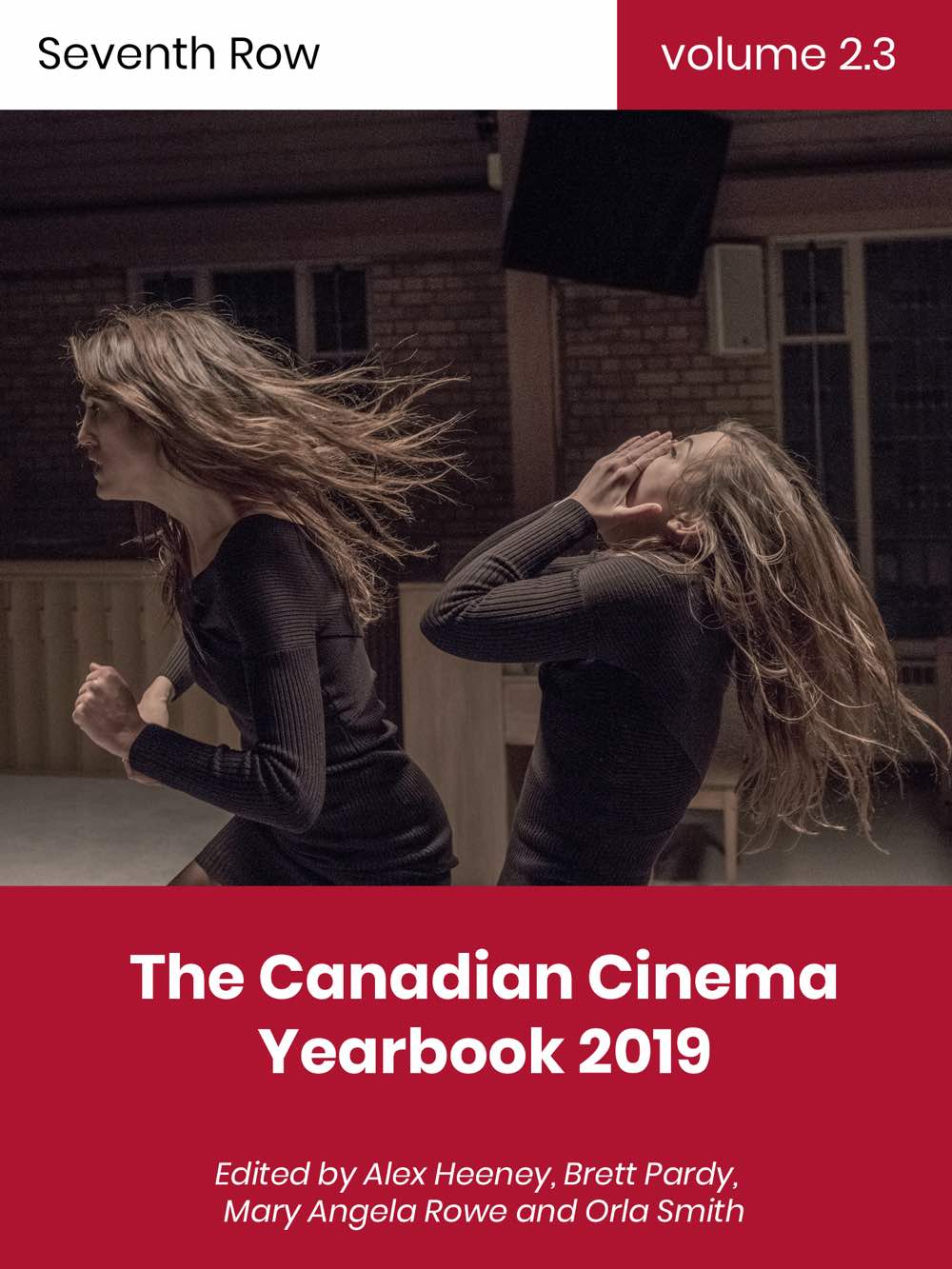Québécois director Maxime Giroux tells us about The Great Darkened Days, his absurdist, poetic, and often brutal fable about the corruptive power of capitalism. This is an excerpt from our ebook The 2019 Canadian Cinema Yearbook, which is available for purchase here.
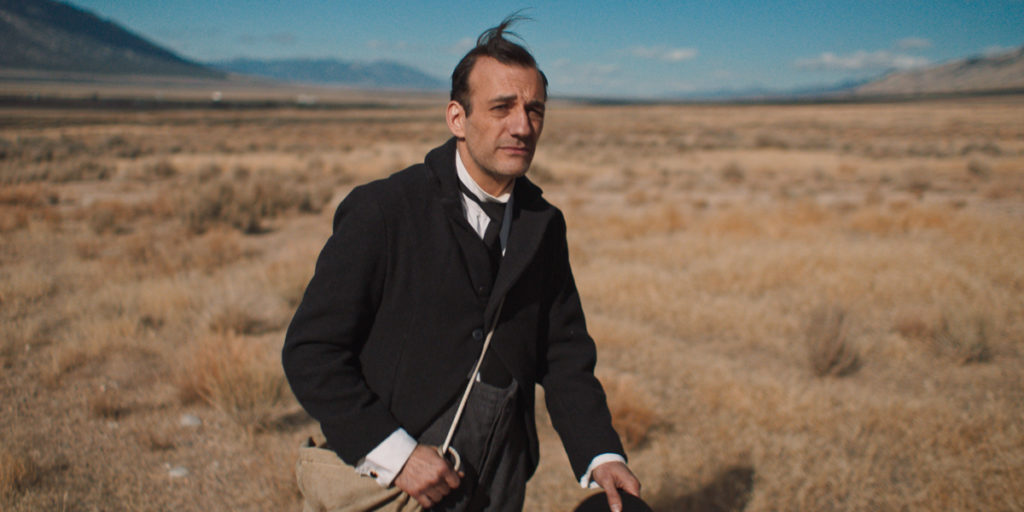
An absurdist and atemporal fable about the rot and corruption of capitalism, Maxime Giroux’s The Great Darkened Days represents a radical departure from his work in his previous effort, Félix and Meira. Following the burgeoning romance between a married Orthodox Jewish woman and a man who does not belong to that faith, the latter was firmly rooted in social-realism. But the two films do not appear simply different; they are diametrically opposed: the quietness and subtlety of Félix and Meira are swapped for chaos and violence in The Great Darkened Days; the beige tones for bright colours; the tenderness for cruelty.
Like Félix and Meira, The Great Darkened Days focuses on a lonely character who longs for connection. In the middle of the desert, somewhere in America, Philippe (the phenomenal Martin Dubreuil) is a stranded Québécois actor trying to get home. Like Meira, whose religion discourages contact with the outside world, Philippe tentatively approaches strangers who lend him a hand. Unlike her, he is repeatedly betrayed by those people, who quickly prove to be unscrupulously evil.
Soon, Philippe finds himself embroiled in a violent conflict that is all the more terrifying for the way its nature, its cause, and its purpose remain as vague and undefined as the time and place the story unfolds in. To both Philippe and the audience, the enemies shooting at him are unseen, and the reason why so many people want Philippe to suffer are unclear. In this general sense of confusion and danger, Philippe’s innocence and persistent empathy pierces the fog of cruelty and despair, and anchors this elaborate fantasy in our reality.
Maxime Giroux told us about the frustration that fuelled this very personal project, the deserted American towns he shot the film in, the balance between realism and abstraction, and much more.
Seventh Row (7R): What was the genesis of the project?
Maxime Giroux: We are three on the project to have written the film. Simon Beaulieu arrived with the synopsis for a period drama, with a budget of around 8 or 10 million dollars. But for an arthouse film, that kind of money is impossible to raise in Quebec. So I said, “Forget it, we can’t do this now. Maybe one day, when I’m seventy years old, and I’m like Denys Arcand.” And I focused on another project, but I didn’t manage to get the money I needed for that other project.
There was a really intense weekend where I even considered not making any more films. Then eventually, I remembered Simon’s idea. I called him and said, “Let’s do it, but in a way where we can make it with little to no budget, write it very quickly, and shoot in five months with zero dollars.” With my money, with a bit of money from Metafilm, Nancy Grant’s and Sylvain Corbeil’s production company. We wrote the script while keeping in mind the fact that we basically had no money. So we had one camera, one character, in the desert.
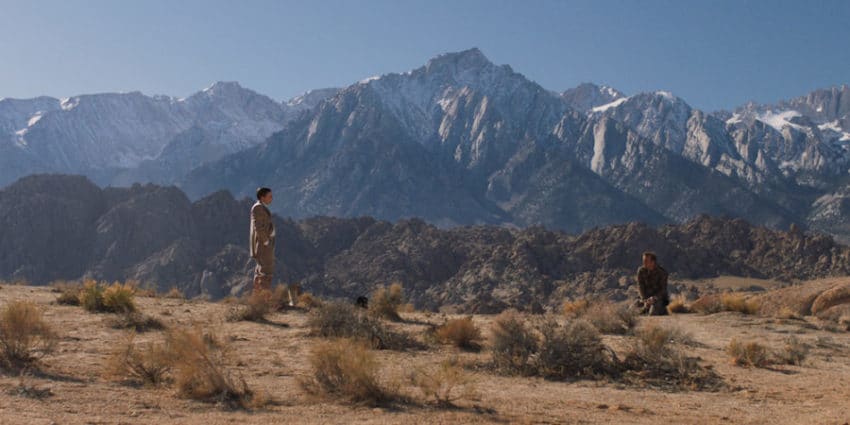
I work in advertising, as well, and this is my most personal film, because the main character tells a bit about me, about my struggle with the world of advertising. I’m part of the pyramid. I’m one of the people in marketing who makes it so that people buy the products. My goal in life is to only make the films I want to make, without having to think about finding an audience for them. It’s not easy to do that these days. It’s what I decided to do with this film. I was thinking, “If it’s the last film I ever make, then I’ll do whatever I want, I don’t care!”
There were people who wanted to buy the film based on the script, and I was telling Sylvain [Corbeil, the producer], “If they want to buy it, they can, but I don’t want them to give me any comments or suggestions on the film. Even if they think their idea might help the script, I don’t care. I don’t want to change the script. Even if there are things that don’t work, I want to make the film with a total freedom, with its faults and its qualities.” It was a necessary gesture as an artist.
7R: Is this the first time that you worked with this much freedom? I imagine that short films allow for more freedom.
Maxime Giroux: When it comes to short films, you have more freedom. I nevertheless have managed to make little films with a lot of freedom — even the previous one, Félix and Meira. To get the money to make a film, you have to write the script and give it to institutions such as the CNC in France, and there are always comments. It’s long and annoying, and three years later, you’re still writing the script, but the flame is gone. This film, I wanted to make it, and I didn’t want to wait for other people’s money. I wanted to make it quickly. My next film, it’s the complete opposite: four or five million dollar budget. I don’t know if we’ll get it, but the writing has been done and “perfected.”
7R: Félix and Meira has a very different style from The Great Darkened Days. How do you go from one style to the other?
Maxime Giroux: It’s the topic of the film that dictates the style, for me. I know that some filmmakers have a very well defined, constant filmmaking style, and they adapt their topic to it. Many of the biggest directors are like this — Woody Allen, Xavier Dolan, Quentin Tarantino, Martin Scorsese — their style is very defined. For others, it’s not like that — Gus van Sant, for example. I’d say I’m in that category. When he made Milk, he wanted the film to reach as many people as possible, because the topic was important. Last Days was a much more personal film, about a character, Kurt Cobain, who wasn’t well, and so Van Sant made a more austere film. I think it’s kind of the same for me: the topic dictates the style.
Félix and Meira is about Hasidic Jews who are very discreet in Québécois society. We don’t really see them, and they don’t want to be noticed. They don’t want to talk to people… I had a desire for humility when approaching that topic. Subtlety, too. I couldn’t talk rubbish about this; I had to be careful. Here, I’m talking of the “capitalist system,” in a way, and that system is coarse, absurd, and violent, so I made a film that was coarse, absurd, and violent. And coloured like the marketing of the system: we sell you the dream. But in reality, it’s far from being the dream; it’s the very opposite.
[click_to_tweet tweet=”‘I’m talking of the capitalist system, in a way, and that system is coarse, absurd, and violent, so I made a film that was coarse, absurd, and violent.’ –Maxime Giroux” quote=”‘I’m talking of the capitalist system, in a way, and that system is coarse, absurd, and violent, so I made a film that was coarse, absurd, and violent.’ –Maxime Giroux”]7R: Do you like to do something different with every film?
MG: After Félix and Meira, I wanted to make a film that would be less subtle where I could have more fun with the cinematographic form. In The Great Darkened Days, it almost feels like we’re in a B movie, after a while — a genre film. As the story progresses, we come closer to the genre film, and closer to the violence that, in a way, characterises Hollywood. Then, at the end, we return to something more contemplative, which is more of the realm of auteur cinema. I wanted to play with cinema. It was really important for me.
I also chose this aesthetic because Hollywood has always been hand in hand with American capitalism and the American Dream. It’s with that dream that they managed to sell us the way of life we have today and which they continue to sell. Except that now, it’s not only America selling it, it’s the entire world. But it still comes from Hollywood. Even if it’s not cinema, then it’s Netflix, it’s the music, it’s everything — and it remains the American Dream.
To read the rest of the article, purchase a copy of The 2019 Canadian Cinema Yearbook here.
[wcm_restrict]
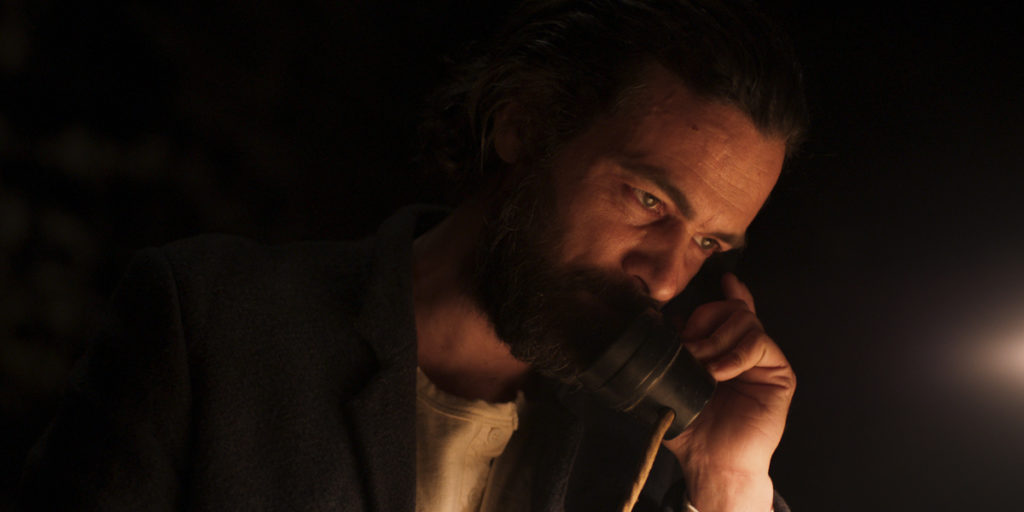
7R: The film is absurdist, but never ironic or cynical. It’s very sincere. It feels very measured, this balance between comic absurdity and sincerity. The character played by Romain Duris is funny at times, because he’s absurd…
Maxime Giroux: It’s very big. It’s caricatural and cliched.
7R: Yes. He’s funny, but he’s also scary, because we don’t know his limits.
Maxime Giroux: Just like the world we live in. We don’t know why all these things happen, but they do.
7R: How did you work to find a balance in this absurdity? Did you rehearse a lot? Did you rewrite scenes many times?
Maxime Giroux: We didn’t rehearse with the actors, because we didn’t have the time. But they were such good actors anyway. They understood the text. They removed sentences; they’d make suggestions. Romain [Duris], Reda [Kateb], Sarah [Gadon], everyone — they all made it better than what we’d written. They really helped the film. Shooting with great actors makes a big difference.
But I have to admit that, when I was shooting the film, I had vertigo at every instant, because I knew that I was always playing on the thin line between “it doesn’t work” and “it works.” I watched the film for the first time in a real cinema yesterday, and I think there are some scenes that are on the verge of not working, and others that work perfectly. But at the same time, that was part of the gamble: I wanted to give myself the permission to try some things.
Finding the right dosage was the hardest part of the process. Already at the writing stage, some people were saying, “The dialogue is too big. Maybe we should make it less caricatural.” But I really didn’t understand them, and I told them, “No, we have to go to the end of this.” In fact, I was taking a huge risk. I can’t say that I was in control of everything. In a way, unconsciously, you do control everything, and there is a world that exists in your head, and you work from that space. But I can’t say that I knew what I was doing completely, and I don’t think the majority of filmmakers do.
[click_to_tweet tweet=”‘There is a world that exists in your head, and you work from that space. But I can’t say that I knew what I was doing completely, and I don’t think the majority of filmmakers do.’ –Maxime Giroux” quote=”‘There is a world that exists in your head, and you work from that space. But I can’t say that I knew what I was doing completely, and I don’t think the majority of filmmakers do.’ –Maxime Giroux”]7R: And isn’t it better to find things out while you’re making the film rather than in advance?
Maxime Giroux: Well, it’s basically impossible to make a film in advance. Otherwise, we would all make great films! When I hear filmmakers say, “Yes, that’s exactly what I wanted to do,” I want to say that’s genius. But geniuses, in 2018, there aren’t that many.
7R: The character of Philippe is our anchor through the film, even through its craziest moments. Even if the things that happen around him are insane, he remains a real, sensible person, and thus he anchors everything. How did you construct this character, and how did you work with Martin Dubreuil?
Maxime Giroux: I’ve known Martin for a few years. I’ve made short films with him. If he couldn’t or didn’t want to make the film, we just weren’t going to do it at all. I knew very well that Martin had this ability to have a certain humanity just by being there, by being present. There’s also something of a silent film star in his face, and he’s a very physical actor.
He was shooting another film just before ours, and in that film, he had many lines. So I told him to concentrate on that film, and not to read the script for The Great Darkened Days until he was in the plane coming to our shoot. His work for this role was to not prepare himself. Because I knew that the role was made for him. It’s true, Martin has this ability to make people get attached to him. Even in real life, he can do stupid things like you can’t imagine, and people will love him and take him in their arms. There are people like that, like there are people who look like criminals but aren’t.
On set, it was a very physical role, and that is where Martin was at his best — when he had to play with his physicality. We knew very well who we were shooting, so we used that.
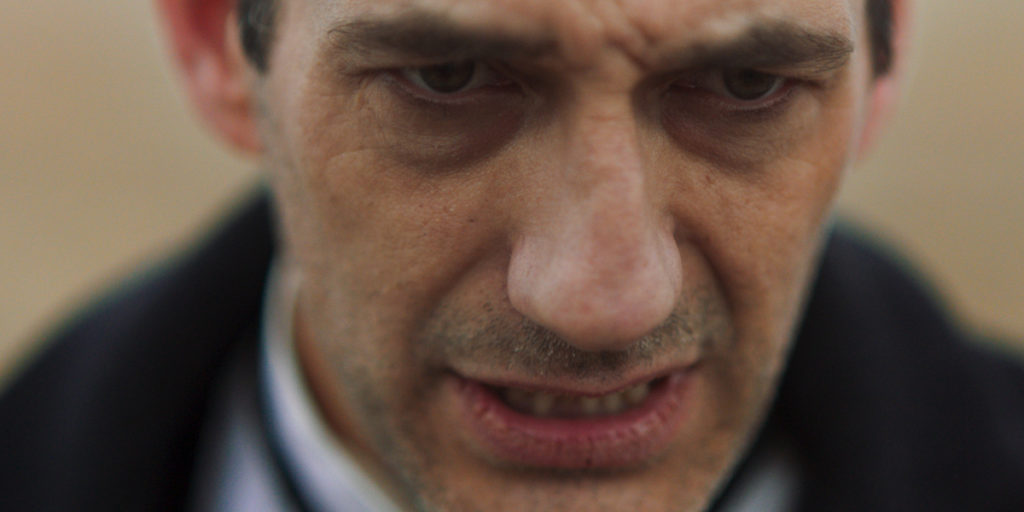
7R: The cinematography in the film changes the meaning of everything that is happening: the fact that everything is so beautiful and so intensely colourful feels like a sign of hope. The sense that things do not have to be horrible, and that they only are this way because of a few bad people. How did you decide on the look of the film?
Maxime Giroux: When we decided to make this film, I had a desire to show certain parts of America that exist for real. They do exist, and I didn’t change a thing in any of the locations, even the buildings. Except, of course, the box that they put Philippe in. My goal was to shoot a part of America that used to be prosperous, villages where there was a source of richness, and where suddenly, when the system took everything, it all went away and all the people left. This part of America also has absolutely wonderful landscapes.
It’s a bit what we’re living every day: we live on a planet of incredible beauty, and we destroy it; we go look for fuel; then, we leave. I wanted to show the absurdity of that system which means there’s a wonderful landscape where we build cities, and they became ghost towns because there was no more money to be made there.
One of the most fun things about the film was going to America to find locations. I went with the cinematographer, Sara Mishara, and the production designer, in the little villages four hours’ drive away from Las Vegas. There’s nothing around; even Hollywood doesn’t go shoot there because it’s too far for them.
It was extraordinary. You could see there was nothing happening there anymore. The economy is completely dead, but there’s a little coffee shop and little houses with ‘Trump’ written everywhere over them. They’re people who vote for Trump, because they’ve been abandoned by the system.
When you talk to them, they’re not bad people; they’ve just been completely abandoned by the capitalist system. And then you’ve got someone who arrives, a champion of capitalism, who tells them, “I want to give you jobs. You can have hope again,” and they believe him. That’s today’s America, but it’s also happening all over the world, and that’s why the far right is gaining power everywhere. People are hopeless.
It was very important for me not to alter the shooting locations in any way. It’s almost a documentary. Visually, it documents those places. There are [fictional] characters, but the locations are unchanged. I had no money to change them, anyway.
7R: I love the anachronistic details — especially that scene with the song in the car.
Maxime Giroux: People either like this scene a lot, or they hate it. It’s the moment where people either leave the theatre or decide to stay. And that’s great; it’s perfect for me. It’s what I wanted.
7R: If they don’t like that, they shouldn’t stay for the rest of the film.
Maxime Giroux: Exactly.
7R: It is in all these details — the costumes, the car — that we get a sense of the war that is occurring in that world. We don’t see the army. How did you work on those details? Why the anachronism?
Maxime Giroux: Rather quickly, I decided I didn’t want to make a period film. I didn’t want it to be a First World War or Second World War film. I wanted to talk about the world of today. I talk about Trump, about the system we live in — a system that has been here for a long time. The film begins on Charlie Chaplin’s speech from The Great Dictator, which was written in 1940, 78 years ago. It’s about tolerance, about the violence of the capitalist system. And 78 years later, we’re still talking about that. So, for me, the film has no period.
At the same time, I didn’t want to make a film anchored in reality — I’ve already done it with Félix and Meira, and I didn’t want to make a social film, even though I love films like that. I wanted to make an absurdist film.
So we decided to insert a few anachronistic things here and there — in 1930, they wouldn’t have televisions like this, the car… We gave ourselves that freedom. The song that the girl plays is from the 1970s, by Sibylle Baier, a German woman who was friends with Wim Wenders. The goal was to tell the viewer, “You’re not in a film where I will tell you a story…” I don’t really tell a story at all, in fact. It’s almost a thesis film. There’s always this desire to keep a distance from the viewer like, “You’re watching a film, and I’m not trying to touch you… You have to think about what you’re seeing.”
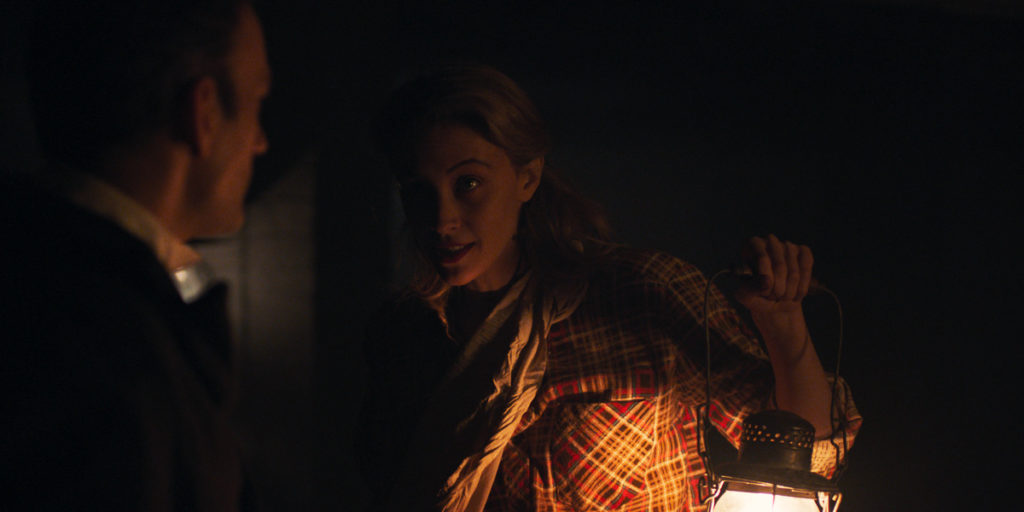
7R: At the same time, despite this distance, there is also a visceral sense of the characters, in their rather realistic performances and in the cinematography. Because it’s a film that makes the viewer think about big ideas, but at the same time, it’s about this one character who is going through an intensely physical experience.
Maxime Giroux: I think that it’s because I made this film, in a way, as a cri du coeur [a passionate plea]. I think. There had to be something very real underneath that. At the same time, you don’t work at it like that… It’s a global context that makes it happen… I don’t know how I arrived at that. I think it’s that I needed to do that.
7R: I think another director might have made a similar film exploring similar ideas, but would have asked the actors to play in a very stilted or artificial way, to underline the themes of good, evil, and capitalism.
Maxime Giroux: I wanted to have a film of anguish, one that makes people feel anguish. I think that if you go too much into the abstract, the viewer understands the language of the film. And on the contrary, what I wanted to do was destabilise the viewer so that they would have truly visceral reactions to what was going on.
[click_to_tweet tweet=”‘If you go too much into the abstract, the viewer understands the language of the film. And on the contrary, I wanted to destabilise the viewer so that they would have truly visceral reactions to what was going on.’ –Maxime Giroux” quote=”‘If you go too much into the abstract, the viewer understands the language of the film. And on the contrary, I wanted to destabilise the viewer so that they would have truly visceral reactions to what was going on.’ –Maxime Giroux”]I think the fact that I come from a kind of cinema that is more realist, like Félix and Meira, means I have integrated that realism. And I can make a sort of genre film in my own way, with a kind of realism in it. I’m not someone who likes genre cinema: I don’t like horror films; I don’t like Tarantino… But I wanted to make it this way.
[/wcm_restrict]
